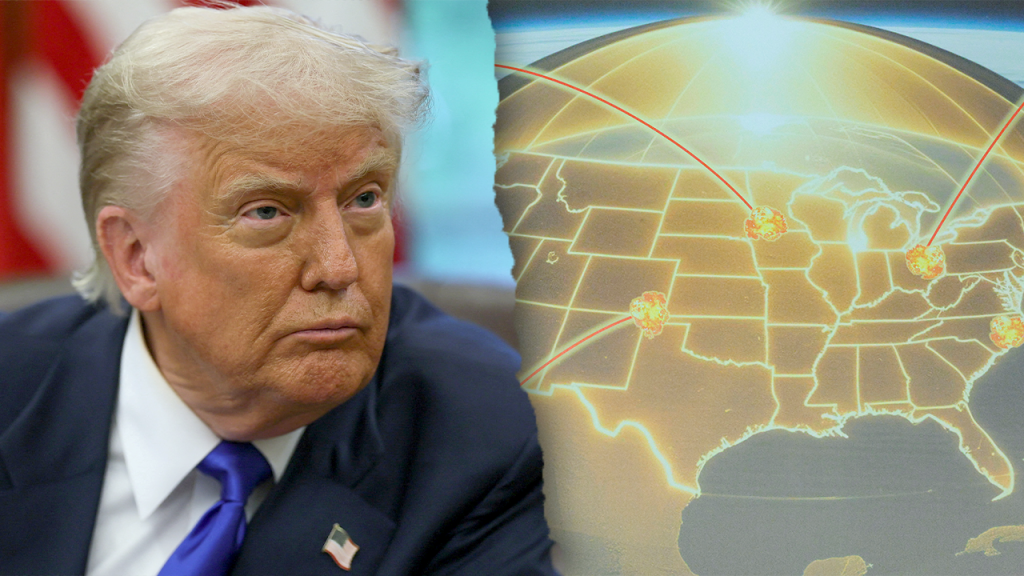In recent developments, tensions between the United States and China have escalated following President Donald Trump’s announcement of a new missile defense system dubbed the “Golden Dome.” Chinese officials have expressed serious concerns, labeling the system as a potential catalyst for an arms race in space. The proposal represents a pivotal moment in U.S. foreign policy, reflecting greater military ambitions at a time when international security dynamics are already fragile.
| Article Subheadings |
|---|
| 1) Overview of the Golden Dome Initiative |
| 2) Chinese Response and Diplomatic Concerns |
| 3) Implications for U.S.-China Relations |
| 4) The Future of Military Innovation |
| 5) Conclusion and Next Steps |
Overview of the Golden Dome Initiative
The Golden Dome initiative, recently unveiled by the Trump administration, aims to establish a comprehensive missile defense system designed to protect the United States from adversarial attacks. Official sources indicate that this system is the brainchild of defense experts who argue it represents a critical upgrade in military technology. During a press briefing, officials highlighted the urgency of modernizing U.S. defenses, citing escalating threats from countries perceived as adversaries, particularly in the context of ongoing tensions with North Korea and Iran.
The proposed system is not only intended to intercept incoming missiles but also to provide advanced reconnaissance capabilities that could enhance U.S. military readiness in volatile regions. These technological advancements suggest a paradigm shift in how military defense will be approached, with greater emphasis on preemptive strategies. The Golden Dome could also integrate artificial intelligence, enabling quicker response times and improved situational awareness in conflict scenarios.
Chinese Response and Diplomatic Concerns
The announcement of the Golden Dome has elicited a swift response from China, whose officials have openly criticized the initiative. Chinese Foreign Minister Mao Ning expressed deep concern over what he termed the project’s “strong offensive nature,” arguing that it contravenes global agreements designed to ensure peace in outer space. In a statement, Mao emphasized that such developments could instigate a new arms race, thus jeopardizing international security and stability.
Worryingly, this response comes against a backdrop of strained U.S.-China relations, characterized by competitive tensions across multiple fronts, including trade, technology, and geopolitical influence. The Chinese government has urged the United States to rescind the proposal, threatening to retaliate if necessary, thus underscoring the growing adversarial posture that could signal a new era of confrontational diplomacy.
Implications for U.S.-China Relations
The implications of the Golden Dome initiative for U.S.-China relations are profound. The Chinese government views this development as a direct challenge to its national sovereignty and military capabilities. Analysts predict that if the United States proceeds with the deployment of the Golden Dome, it could provoke further military buildups by China, exacerbating tensions in the Asia-Pacific region.
Furthermore, the initiative may affect diplomatic dialogues and ongoing negotiations concerning global security protocols. Already, discussions between the two powers on arms control and nuclear disarmament are at a standstill. The expansion of missile defense systems, particularly of such a comprehensive nature, might lead China to reconsider its position on existing treaties, thereby straining multilateral initiatives that aim to promote disarmament and prevent conflict escalation.
The Future of Military Innovation
The Golden Dome initiative reflects a broader trend toward incorporating cutting-edge technology in military defense strategies globally. As nations strive to modernize their armed forces, the competition for technological superiority has reached a fever pitch. The involvement of artificial intelligence and cyber capabilities in this new system could set a precedent for future military innovations.
This technological arms race may encourage additional countries to develop their own missile defense systems or enhance existing ones, further complicating international security. The development timeline for the Golden Dome indicates significant investment in not merely defense but also offensive capabilities, indicating how new technologies can redefine power dynamics and conflicts in international relations.
Conclusion and Next Steps
As the situation surrounding the Golden Dome evolves, it becomes increasingly essential for U.S. policymakers to navigate these tensions carefully. While enhancing national security is a priority, it is equally vital to engage in dialogues that promote peace and avoid an escalation toward conflict.
Going forward, the U.S. must consider collaborative approaches with allies to ensure mutual defense without provoking adversarial responses from nations like China. Building trust and mutual respect through diplomatic avenues could mitigate the perceived threats posed by missile defense systems such as the Golden Dome.
| No. | Key Points |
|---|---|
| 1 | The Golden Dome initiative aims to enhance U.S. missile defense capabilities. |
| 2 | Chinese officials have strongly criticized the proposal, calling it aggressive. |
| 3 | Heightened tensions could complicate U.S.-China diplomatic relations. |
| 4 | The initiative may trigger further military buildups among adversarial nations. |
| 5 | Bipartisan cooperation is essential to balance national security and international peace. |
Summary
The launch of the Golden Dome missile defense initiative marks a crucial moment for U.S. defense policy, potentially reshaping the dynamics of international military strategy. While its purported aim is to bolster national security, the initiative raises significant concerns over escalating tensions with China and the broader implications for global security and military innovation. As the situation develops, it will be vital for U.S. leaders to strike a balance between ensuring protection and sustaining peaceful international relations.
Frequently Asked Questions
Question: What is the Golden Dome initiative?
The Golden Dome initiative is a proposed U.S. missile defense system aimed at enhancing protection against missile threats from adversaries.
Question: How has China reacted to the Golden Dome initiative?
China has expressed serious concerns about the Golden Dome, labeling it as an aggressive measure that could increase the risk of a space arms race.
Question: What are the potential consequences of the Golden Dome on U.S.-China relations?
The initiative could exacerbate tensions between the U.S. and China, complicating diplomatic efforts and potentially triggering a military buildup in the Asia-Pacific region.
